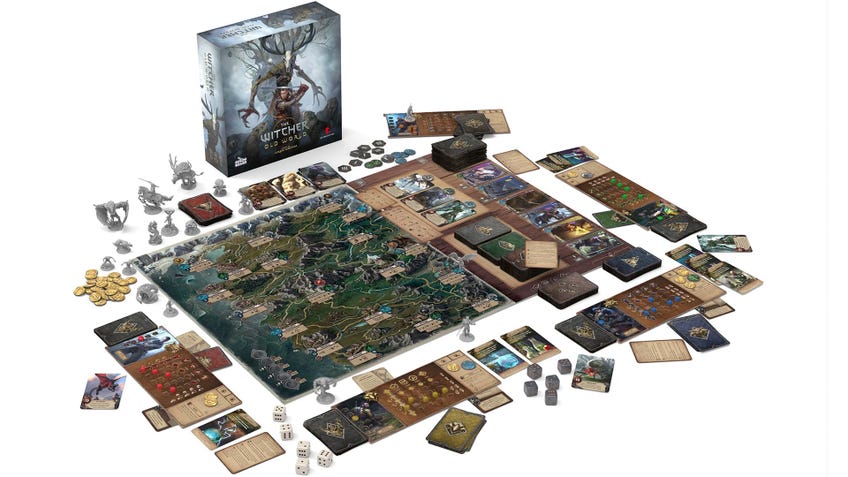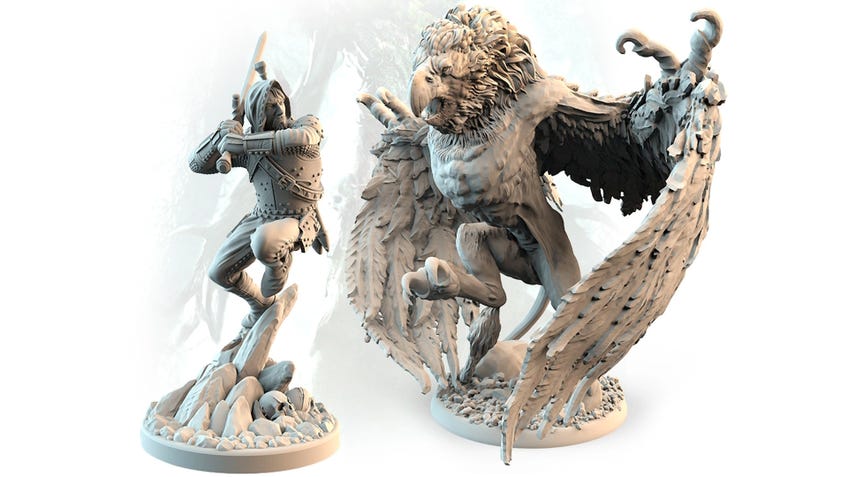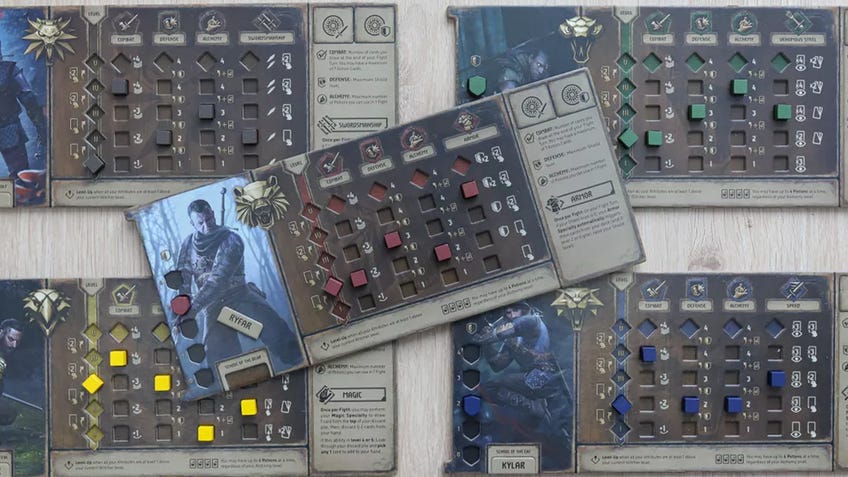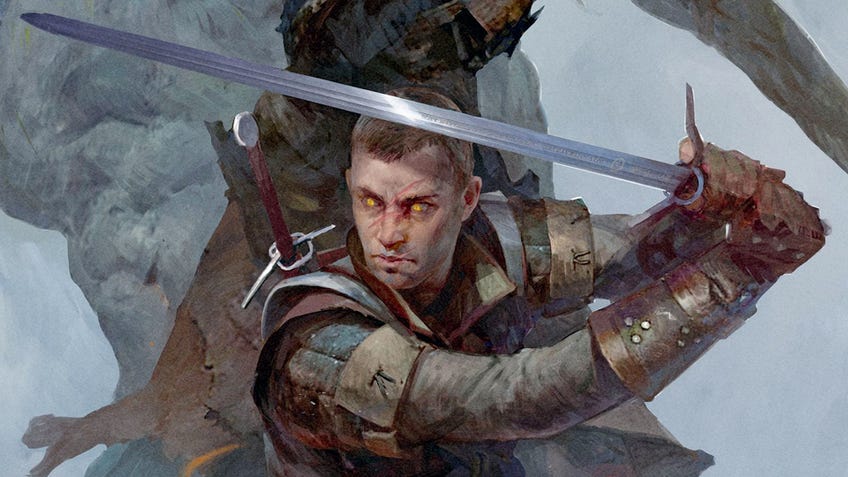The Witcher’s latest board game is a monster-slaying romp that can’t match the rich world of the video games
Combat outshines story in the solid, if shallow, action-adventure adaptation.
It took me two attempts at playing The Witcher 3 to finally ‘get’ it. I had always appreciated its gruff monster-hunting hero Geralt and deep, expansive fantasy world drawn from Andrzej Sapkowski’s books, but found it hard to connect with the video game’s weightless, repetitive combat. Finally hooked, I’d ultimately spend dozens of hours exploring every corner of the Continent, enjoying the rich setting and storytelling between the distraction of so-so swordfights.
The Witcher: Old World, the latest board game to take a stab (with silver or steel, your choice) at adapting the series for the tabletop, runs into the opposite problem. The adventure game is built around a combat system that feels multifaceted and engaging, while lacking the narrative heft and vibrant characterisation that has become a hallmark of The Witcher. That’s not to say there’s not good fun to be had roaming the world in search of monsters to slay, but Witcher fans may find themselves hunting for something with a little more staying power.
Old World takes place before the era of Geralt, while witchers are still a more common sight. As such, each player is a witcher from a different school (Cat, Griffin, Bear, Viper, Manticore or, yes, Wolf), pitted against one another in a race to claim four trophies before their rivals. These trophies can be claimed by dispatching pesky monsters around the world, claiming victory over one of your rival witchers or, er, by meditating.

The earlier setting is an interesting one, and helps to justify the competitive setup of the game. (As well as neatly avoiding arguments over who gets to play as Geralt and Ciri.) Even so, the race-like win condition hints at Old World’s underlying focus on prioritising ruthless monster-slaying efficiency over soaking in its world and stories.
The race-like win condition hints at Old World’s focus on prioritising ruthless monster-slaying efficiency over soaking in its world and stories.
Gameplay is thankfully simple - particularly for a crowdfunded board game with a major licence on the box and miniatures inside. Each turn, you can move between locations on the central map by spending cards from your hand that match their terrain icons, before using each location’s unique power. This could be levelling up your stats (at the cost of gold), gaining helpful potions or simply playing dice poker - which apparently preceded the absent Gwent as the Continent’s game of choice - against the locals to win a couple of coins.
After that, you typically either explore the local area or do battle against a monster or witcher. Exploring is where the bulk of Old World’s narrative arrives, contained in short story snippets on cards that usually then present a choice to players. The outcomes might give an instant reward, a punishment or, occasionally, spin out into a new questline that requires you to seek out another location.
Despite there being dozens of exploration cards - split into city and wilds - and numbered event cards that are read as directed by quests, quests tend to be brief distractions that dress up simple “go here, get thing” actions rather than the vehicle for anything deeper.
Even those that hint at moral quandaries familiar from the shades-of-grey dilemmas in the Witcher video games and books end up being little more than fleeting glimpses. In one case, one of our players decided to cut down an old man who is hinted at being a lizard-person in disguise. The outcome? A bunch of useful potions as they looted his cart, without a question that he might’ve been anything more than another monster in need of dispatching for handy loot. (The other outcome reveals that he’s perfectly harmless, but you’d never know that if you didn’t read both entries.) Other side quests end abruptly as you head to the next directed location only to pull an equipment card with zero narrative resolution.
The reduction in richer narrative favours Old World’s strength in its central monster-hunting loop, as players wander between locations building up their individual deck of cards via Old World’s deckbuilding-lite elements and bumping up their character’s traits in skills such as combat and alchemy, which grant boosted effects when in battle, such as drawing more cards or using more potions.

It’s that combat where Old World shines brightest, with players using their customised deck of cards to pull off strings of attacks to whittle a monster or fellow witcher down to defeat. Old World cleverly uses players’ decks of cards as movement, attacks and as their pool of remaining health points (defeat comes when both your deck and hand are exhausted), resulting in a sharp focus of the player’s attention on how to best optimise their deck and attacks. Combat feels punchy and strategic as the core of the game, without outstaying its welcome in sessions that can already easily stretch into multiple hours.
The combat is the star here, outshining the world, characters and stories that elevated Sapkowski’s original novels and their video game adaptations beyond just another fantasy adventure.
Even so, the necessary trimming of The Witcher into a two-hour (at best) board game means that some of the video games’ detail gets lost even in combat. Rather than being able to prepare specific potions to counter monsters’ unique powers, potions are acquired largely at random here, meaning that they feel like more generic effects than embodying the deliberate preparation of Geralt before a major encounter. Tracking monsters is similarly simplified, boiled down to a trail token that lets you attack first. (The game’s Kickstarter included a number of expansions, including those that promise to add more complexity to monster fights and introduce additional character skills such as mutagens, but I spent my time with the core base game.)
Often, it’s most helpful to spend turns simply grinding out levels and acquiring more cards to bulk up before a fight, hoping that your exploration cards will grant helpful equipment or bonus stats. The third way in which players can obtain a trophy - by spending a turn to meditate once they max out one of their traits - feels like a way of acknowledging that churning your progression is the aim here, but can be a strangely anticlimactic way to take your final step toward victory after battling against increasingly tough monsters. It almost feels like an awkward way to avoid things dragging on if players spend too long grinding levels rather than fighting.

None of this is to say Old World isn’t enjoyable or worth playing in its own right. It is! But it’s a lightweight romp across the familiar fantasy world, rather than a tabletop adaptation that truly captures the essence of what makes The Witcher so engrossing. The combat is the star here, outshining the world, characters and stories that elevated Sapkowski’s original novels and their video game adaptations beyond just another fantasy adventure. This, by comparison, is a thoroughly solid action-adventure game in Witcher clothing.
Witcher fans will likely have a good time romping around, but I suspect you’ll be hankering for a return to the adventures of Geralt before too long - don’t expect this to leave you with anything quite so memorable.


